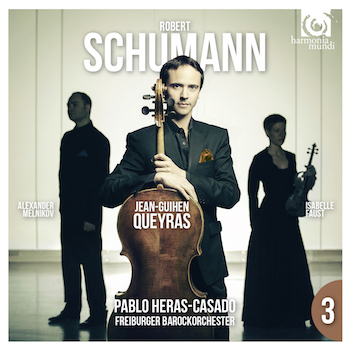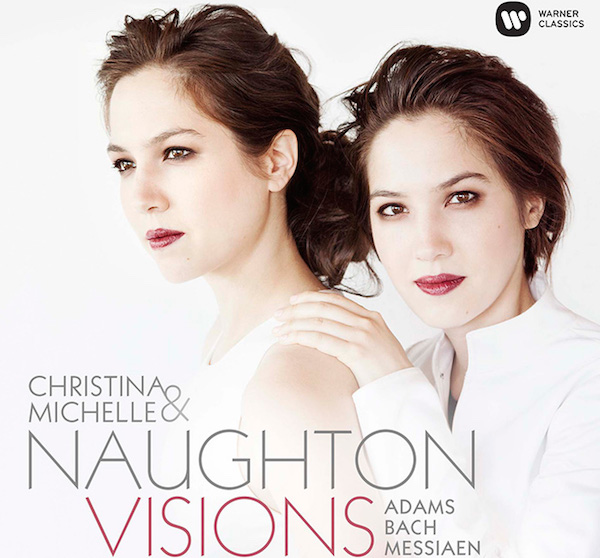CD Reviews: Schumann’s Cello Concerto, “Visions,” and Janowski’s “Ring of the Nibelungen”
Jean-Guihen Queyras wraps up HM’s Schumann concerto trilogy in style, duo-pianists (and twin sisters) Christina and Michelle Naughton play with enormous panache and color, and Marek Janowski’s new(-ish) recording of Wagner’s Der Ring des Nibelungen is a mixed bag.
By Jonathan Blumhofer

The first two installments of Harmonia mundi’s (HM) Schumann concerto trilogy have been decidedly mixed: Isabelle Faust’s impressive reading of the Violin Concerto was followed by Alexander Melnikov’s sloppy and stiff rendition of the Piano Concerto. Now comes Jean-Guihen Queyras wrapping up the series with the Cello Concerto and it turns out that HM has saved the best concerto performance for last.
Queyras’ reading of the Concerto is dreamy and supple: listen to how he navigates the contrasting ideas in the first movement for an example of musical poeticism that at once embodies high Romanticism and the avant-garde – Stockhausen and Schumann have rarely seemed such close spiritual kin as they do here. At the same time, it’s simply wonderful cello playing, articulate, thoughtful, and filled with color. Queyras’ playing of the last movement cadenza alone is worth the price of the disc: spirited, thoughtful, and dramatic.
Part of the reason the interpretation works so well, too, owes to the fine accompaniment Pablo Heras-Casado and the Freiburger Barockorchester provide. Has the Concerto’s slow movement sounded more like a true serenade than it does here? Possibly – but that doesn’t take anything away from the delicate synchronicity between soloist and orchestra here, especially over its first half. The same holds true for the spirited rendition of the finale they turn in. Its polonaise-ish episodes pack a jovial kick and the recapitulations of themes heard earlier in the piece come across with revealing subtlety.
To close the album, Queyras is joined by Faust and Melnikov in a vibrant, stormy account of the Piano Trio no. 1. The first movement seethes; the second drives forward with, at times, an almost primal energy; and the third sings with stunning inward beauty. If the finale runs a bit wild, well, it’s it should: it’s music of catharsis played by this ensemble that demonstrates terrific tonal warmth, rich color, emotional understanding, and rhythmic verve; a grand finale, indeed.

A straight line from Olivier Messiaen to John Adams is maybe not the most natural of pathways to follow – Richard Taruskin has argued forcefully that this is the case – but Visions, the engaging new album from duo-pianists (and twin sisters) Christina and Michelle Naughton suggests that such a bias ought to be reconsidered. Their particular course follows the trajectory of Messiaen’s delirious Visions de l’Amen, a seven-movement meditation on the relationship between God and man, and culminates in Adams’ exuberant Hallelujah Junction, a piece whose content is far less sacred than its title might suggest. In between comes György Kurtág’s arrangement of the “Sinfonia” from Bach’s Actus tragicus cantata (BWV 106).
How this all works and comes together so well is a bit of a mystery. Certainly there are parallels between the Messiaen and Adams scores: driving rhythms, hard-edged dissonances, repetition. They also share a certain sameness of trajectory, beginning in one defined place and, over the course of several movements, ending up in another.
But there’s also an appeal to these performances that’s much less intellectual: it’s simply exciting to hear Visions and Junction played with such panache and color. The Naughtons mine the elemental drama of the former, with a mysterious, granitic performance of the first movement (“Amen de la Création”); an anguished reading of the third (“Amen de l’agonie de Jésus”); and playing of delicately floating sensuality in the fourth (“Amen du Désir”). They cap their interpretation off with a run-through of the finale (“Amen de la Consommation”) that marries a spirit of unbridled ecstasy with rhythmic vigor and tonal luster; the result is simply irresistible.
Their take on Hallelujah Junction offers more than a few of these same qualities. This is a performance that really dances off the page – the last movement offers a blend of tonal steel and spiritual exuberance that is downright Messiaen-like – and sings. In comparison to Junction’s debut recording on Nonesuch (with Rolf Hodges and Nicolas Hind), the Naughtons deliver a reading that’s a bit brighter and wickedly clear: the speed and precision with which they execute some of the score’s most devilish rhythmic turns in the outer movements recalls a player piano, so exact their playing. At the opposite extreme, their account of the Glass-like second movement is an example of beautiful, lapping stasis.
Bridging these two disparate scores is a time-stopping reading of the Bach “Sinfonia,” surely one of the most wrenching pieces from that composer’s pen. It’s played with touching serenity here: an oasis of stillness and simplicity that speaks with a directness that’s at once ancient and modern.

Can recorded lightning strike the same conductor twice (so to speak)? That’s a big question behind Marek Janowski’s new(-ish) recording of Wagner’s Der Ring des Nibelungen on Pentatone, taped live and released individually over the last couple of years but out as a complete set in May. Janowski, of course, presided over a conspicuously strong recording of the tetralogy in the early ‘80s (the first digital recording of the set, in fact), one that’s aged extremely well. Then again, how couldn’t it have? His cast then was superb: Theo Adam as Wotan, Yvonne Minton as Fricka, Siegfried Jerusalem as Siegmund, Jessye Norman as Sieglinde, Rene Kollo as Siegfried, Peter Schreier as Mime (and Loge), Matti Salminen as Fafner (and Hagen), and Siegmund Nimsgern as Alberich. The only real weak link (if she could be labeled such) was Jeanine Altmeyer’s Brünnhilde, who lacked a certain refinement of tone and brilliance of range, but even she had her moments.
Alas, save one singer – the timeless Salminen, who reprises his old roles in the last two operas – Janowski’s current cast doesn’t consistently match his old one; most of the time, in fact, they’re considerably less impressive. But more on that later: first, the good.
And that would begin with Pentatone’s recorded sound which, in a word, is impeccable. Everything in this Ring is balanced conscientiously and musically. The Cycle’s tremendous climaxes sound fully but without any shrillness and the many quiet, introspective moments are realized with immediacy. Indeed, this is that rarest of Rings, one in which you don’t have to touch your volume dial once, so well-engineered and mixed are these recordings. Coming all from live performances, that’s a terrifically impressive technical accomplishment.
Expressively, there’s much to admire here, too. Janowski’s approach to these operas is noticeably deeper and more nuanced than it was thirty years ago. That’s not to say that he was a lackluster Wagnerian then – not at all – but the experience and wisdom that he’s accumulated with this music since tells. His conducting in each score is clear-sighted and focused, always holding the big picture in view. He draws playing of real urgency and passion from the Rundfunk-Sinfonieorchester Berlin (RSO) and, thanks in part to the excellence of these recordings, you can hear almost everything that’s going on in the orchestral fabric, which is no mean feat, especially at the end of Act 1 in Die Walküre and the final apotheosis of Götterdämmerung. Sometimes he drives a bit too hard but, on the whole, Janowski delivers a terrific sense of pacing – nothing drags; surely, this is one of the fleetest Rings on record.
If only this were a recording, then, of the RSO playing one of Lorin Maazel’s instrumental adaptations of Wagner. Unfortunately, it’s not, and the singing across these four operas ranges from the erratic to the fine. Among the latter must stand Salminen’s Hagen in Götterdämmerung: it’s as imposing in sound as (if, perhaps, a bit rougher than) it was in 1983, but even more psychologically complex and monstrous. In Siegfried, Stephen Gould’s account of the title character is virile and dynamic, while Violeta Urmana’s Brünnhilde is similarly strong and compelling.
If only the two of them had also sung Götterdämmerung. Here, through some quirk of programming, we get Petra Lang as the heroine (she also sings this part in Die Walküre) and Lance Ryan as Siegfried. Lang is a mezzo and, while there have been mezzos who’ve triumphed in this soprano role in the past, in this recording she’s out of her depth. In Die Walküre her singing is at least passable, if a bit stiff (especially true in the opening half of Act 3). But in Götterdämmerung, Lang’s voice sounds forced, her pitch doesn’t always run true, and there’s nothing approaching the glorious ownership of the role that any of the great Brünnhildes of the past fifty years brought to the part. The less said about the Immolation Scene, the apex of this entire Cycle, the better; suffice it to say, it’s a major disappointment.
Ryan is a similarly tough sell.Throughout Götterdämmerung he sounds overwhelmed by the part (and, sometimes, the orchestra, too), thin-toned, and as though he’s straining to make (or leave) an impression. Listening to his duet with Lang at the end of the opera’s Prologue is downright uncomfortable: the two seem to be singing past one another, the former singing over everything, the latter sounding tentative and much smaller than one expects the hero of this epic ought to be, vocally. Things improve a bit as the opera progresses, but not enough: by the time Siegfried’s killed off in Act 3 it comes as something of a relief, especially given the total lack of mystery with which Ryan imbues the character’s dying reminiscences of Brünnhilde.
Other vocal shortcomings in the set include the warbling trio of Rhinemaidens at the beginning of Das Rheingold (and again in Götterdämmerung), similarly afflicted and raw-sounding Norns in Götterdämmerung, and a shrill band of Valkyries in Die Walküre.
Tomasz Konieczny’s Wotan is, as a general rule, appropriately stentorian, though he comes across as more of a gruff, one-dimensional character than not, especially in his interactions with Brünnhilde in Act 3 of Walküre. Perhaps it’s appropriate, but, as his opposite number, Iris Vermillion makes for a somewhat matronly, Fricka.
The rest of Janowski’s cast is adequate, if not always inspired. The best of them, Robert Dean Smith and Melanie Diener, turn in respectable and, at times, downright compelling performances as, respectively Siegmund and Sieglinde. Timo Riihonen’s Hunding lacks some of, say, Kurt Moll’s gravitas in the part but he still works up a storm when he needs to. Christian Elsner’s Loge (in Das Rheingold) and Mime (in Siegfried) come across well: impressively lyrical in the former and sympathetic in the latter. Jochen Schmeckenbecher is an appropriately dour Alberich. Also, Anna Larsson’s Erda and Sophie Klussmann’s Waldvogel stand out in their small-ish parts in Siegfried.
So, in the end, like just about all complete Ring Cycles, here we have a mixed bag, but this one a bit worse than not, vocally, for wear. It’s a shame, given the excellence of the orchestral performance, Janowski’s propulsive conducting, and Pentatone’s engineering – but what can you do?
Jonathan Blumhofer is a composer and violist who has been active in the greater Boston area since 2004. His music has received numerous awards and been performed by various ensembles, including the American Composers Orchestra, Kiev Philharmonic, Camerata Chicago, Xanthos Ensemble, and Juventas New Music Group. Since receiving his doctorate from Boston University in 2010, Jon has taught at Clark University, Worcester Polytechnic Institute, and online for the University of Phoenix, in addition to writing music criticism for the Worcester Telegram & Gazette
